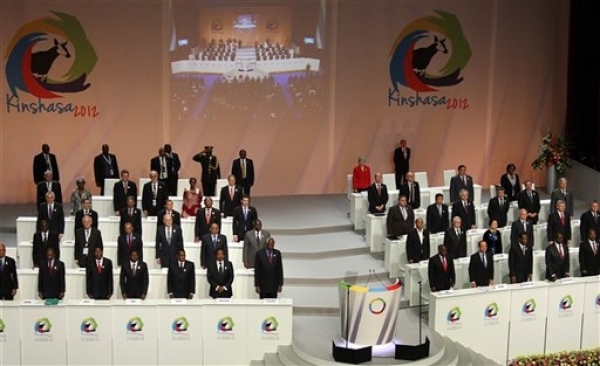Will the President of the Republic Become Secretary General of the International Organization of La Francophonie?
The International Organization of La Francophonie
The first appearance of the word ‘Francophonie’ was in 1880 when the French Geographer Onésime Reclus coined the word with reference to the community of people and countries that speak the French language. The term was next used in 1926 when a number of writers founded the Francophone Association of Writers and later in 1955 when journalists followed suit and founded the International Francophone Press Union.
On March 20, 1970, the Agency of Cultural and Technical Cooperation was established in the presence of representatives of 21 countries and was the precursor to what is now known as the International Organization of La Francophonie.
Objectives
The International Organization of La Francophonie was created with the following objectives:
- to establish and to develop democracy;
- to respect human rights;
- to prevent, manage and regulate conflicts;
- to promote dialogue among cultures and civilizations;
- to bring people together through mutual understanding;
- to promote education and training.
In order to serve these objectives, the International Organization of La Francophonie works towards:
- Promoting the French language and cultural and linguistic diversity;
- Promoting peace, democracy and human rights;
- Expanding cooperation for sustainable development.
Member States
The International Organization of La Francophonie currently consists of 77 member states, 57 with a permanent status and 20 with an observer status. It is to be noted that the majority of the member states are poor countries that suffer from dreadful political and economic crises.
Member States
France , Canada , Cyprus , Kingdom of Belgium , Romania, Switzerland, Senegal , Tunisia , Morocco, Lebanon, Egypt, Greece, Chad, Albania, Principality of Andorra, Armenia, Benin, Bulgaria, Burkina Faso, Burundi, Cambodia, Cameroon, Cape Verde, Central African Republic, Equatorial Guinea, Guinea-Bissau, Guinea, Ghana, Gabon, Qatar, Niger, Moldova, Monaco, Mauritius, Mauritania, Mali, Luxembourg, Laos, Haiti, Rwanda, Seychelles, Comoros, Congo, Ivory Coast, Djibouti, Dominica, Republic of Macedonia, Saint Lucia, Säo Tomé, Vietnam, Vanuatu, Canada-New-Brunswick, Québec.
Observers
Austria, Bosnia-Herzegovina, Croatia, UAE, Estonia, Georgia, Hungary, Lithuania, Montenegro, Mozambique, Poland, Dominican Republic, Czech Republic, Serbia, Slovakia, Slovenia, Thailand, Ukraine, Uruguay, Latvia.
IOF Operating Agencies
The agencies associated with the International Organization of La Francophonie are:
- The Association of Francophone Universities founded in Canada in 1967 and currently including 739 research and university institutions;
- The International Association of French-Speaking Mayors;
- Senghor University of Alexandria founded in 1989 to train high-ranking cadres within the Francophone countries;
- TV5Monde, the French-speaking global television network headquartered in France;
- The Assemblée Parlementaire de la Francophonie (APF) headquartered in France and having a consultative role;
- The Permanent Council of La Francophonie chaired by the Secretary General and gathering ambassadors of the member states. It is tasked with monitoring the execution of the resolutions of Francophone Summits.
General Secretariat
The IOF’s General Secretariat and Secretary General are in charge of managing the Francophone agencies mentioned above. The Secretary General is elected by representatives of the Member States for a renewable four-year term of office. This post was introduced during the Summit meeting of La Francophonie held in Vietnam in 1997. Because the IOF’s General Secretariat is located in France, that country has a decisive role in choosing the Secretary General.
Boutros Boutros Ghali, former Secretary General of the United Nations (1992-1996), was the first Secretary General of La Francophonie, serving from 1998 to 2002. Since 2003, the IOF has been under the leadership of Secretary General Abdou Diouf, former President of Senegal. Both Boutros-Ghali and Diouf are prominent international figures most known for their political, intellectual and administrative contributions at both local and global levels.
Budget
In 2012, the IOF’s budget stood at 81 million Euros, two thirds of which were allocated for the implementation of the agenda. The budget is amassed through contributions from the member states and corporate donations from both public and private sectors.
Summit Meetings
The IOF convenes biennial summit meetings with the participation of Heads of State and Premiers or their representatives. 14 Summits have been held so far, the first of which was in Versailles, France, in 1986, followed by Canada in 1987. Lebanon hosted the Summit of La Francophonie between October 18 and 20, 2002 and the most recent Summit took place in Kinshasa, in the Democratic Republic of Congo. The next Summit is scheduled for the end of November, 2014 in Senegal.
At the ministerial level, the IOF organizes two permanent ministerial conferences: one for the Ministers of Education and one for the Ministers of Youth and Sports. It also holds an annual conference attended by the Ministers of Foreign Affairs or the Ministers of La Francophonie.
The Capital and largest city of Senegal, Dakar, will host the 15th Summit of La Francophonie at the end of November this year, and it remains to be seen whether the gossip will end up materializing and whether or not President Michel Suleiman will be elected Secretary General and moving from Amshit to Paris six months after his departure from his presidential office.








Leave A Comment